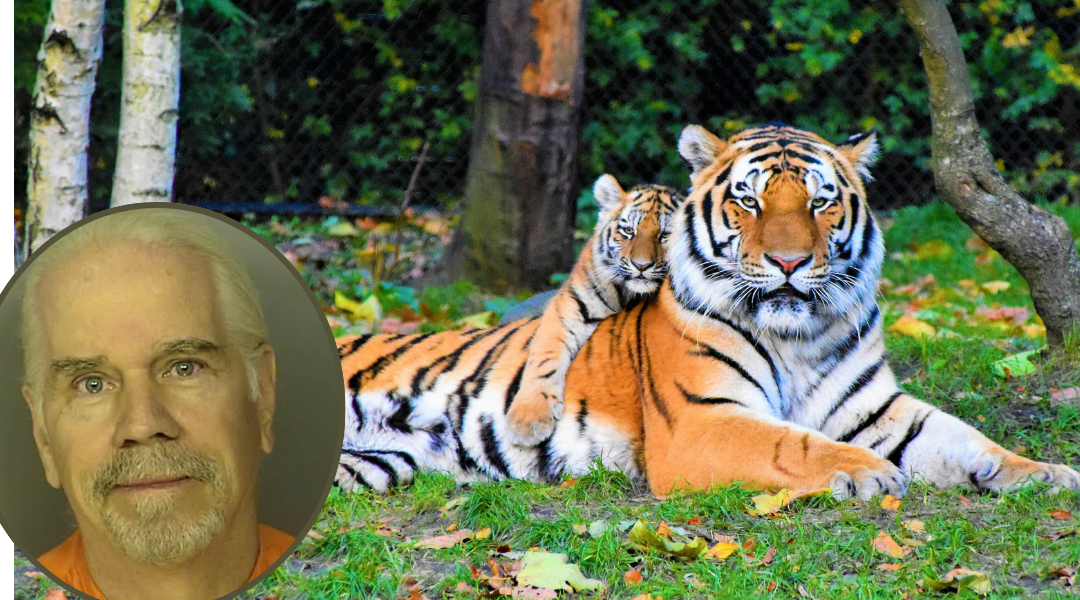Bhagavan “Doc” Antle, the controversial figure from Netflix’s Tiger King, now faces a 12-month prison sentence after admitting to trafficking endangered wildlife and laundering over $500,000. He believed the money came from a human smuggling operation.
For years, Antle promoted his Myrtle Beach Safari as a conservation haven. But investigators uncovered a disturbing reality behind the polished image.
They discovered that Antle used his nonprofit, the Rare Species Fund, to mask illegal animal sales and launder illicit funds. Behind the scenes, he orchestrated deals involving baby chimpanzees, cheetahs, lions, and tigers—endangered animals treated as commodities rather than sentient beings.
The Crimes Hidden Behind a Zoo Fence

Federal agents exposed Antle’s direct involvement in buying and selling endangered animals, including tigers, cheetahs, lions, and chimpanzees. He disguised the transactions as charitable donations to his nonprofit, the Rare Species Fund. In one deal, he paid $200,000 for a juvenile chimpanzee and a gibbon.
He didn’t act alone. Antle often worked with partners to create false paperwork and avoid legal detection. He conducted transactions in cash and manipulated records to cover up illegal interstate transfers of protected species.
In one case, he paid $35,000 to acquire two cheetahs from Florida. Later, he accepted $15,000 in exchange for two lion cubs. By labeling the payments as donations, he bypassed regulations and concealed the animals’ commercial value.
Money Laundering and a False Conservation Image
Between February and April 2022, Antle laundered more than half a million dollars. He worked with a co-conspirator to move cash they believed came from undocumented immigration activities. Antle deposited the funds into bank accounts he controlled, then issued checks back to the source after taking a 15% cut.
He tied these laundering schemes to his zoo operations. Through staged construction payments and layered financial steps, he attempted to clean the money while continuing to profit from wildlife exploitation.
According to federal officials, he built an elaborate system to mask both his financial crimes and his role in the illegal animal trade.
Others Involved Face Consequences

The investigation didn’t stop with Antle. Jason Clay, who supplied him with a chimpanzee and gibbon, received four months in prison and four months of home detention. Another associate, Andrew Sawyer, received two years of probation and eight months of home detention. He also forfeited $185,000 and a chimpanzee.
In a connected case, Shaylynn Kolwyck-Peterson admitted to illegally selling a newborn chimpanzee to Antle. She operated Sunshine Zoological Preserve in Florida, which had bred chimpanzees for private ownership—the only known facility of its kind in the U.S.
“These sentences should send a clear message,” said FBI Special Agent Kevin Moore. “We will not tolerate those who exploit protected species or abuse our financial systems.”
The Cost to Animals
The animals caught in these illegal deals suffered greatly. Many were torn from their mothers, caged in unnatural environments, and sold like merchandise. Chimpanzees, lions, and tigers—all intelligent and emotional beings—faced lives of captivity and confusion.
One wildlife advocate explained, “Doc Antle’s choices inflicted deep harm. These animals deserved protection, not profit.”
Antle must now pay a $55,000 fine, forfeit nearly $200,000 and three chimpanzees, and serve three years of supervised release after prison. While his sentence won’t undo the trauma animals experienced, it represents a vital step toward accountability.
Why This Matters
Wildlife trafficking remains a global crisis, generating billions annually. For years, individuals like Antle operated under the radar, using the illusion of conservation to justify harmful practices. But this case shows that the justice system can act when the truth comes to light.
Antle’s fall may serve as a turning point—a warning to others and a reminder that animals are not props or possessions. They are living beings who deserve respect, safety, and the right to live wild and free.






